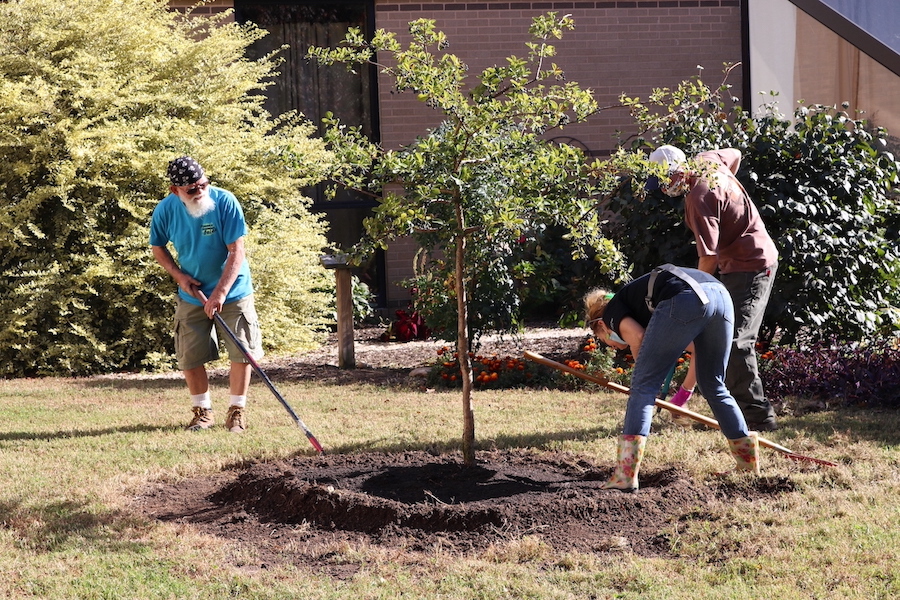Pope Francis’ encyclicals ‘driving force’ behind efforts at ICC, Hampton
Operating under the ethic that “the world is a gift to you and the people following you,” Immaculate Conception Catholic Church (ICC), Hampton, continues to implement environmental projects that will last decades, if not lifetimes.
“To care for our common home, Earth, and foster deeper social relationships with other communities beyond our own borders are moral values our parish seeks to promote and live out,” said Father John Grace, ICC pastor.
Committed to Pope Francis’ 2015 encyclical “Laudato si’: On Care for Our Common Home,” the parish installed 440 solar panels on the church, administrative wing and classrooms in 2019 to become the first Virginia parish to be 100% solar, and it installed panels on the rectory in fall 2020.
The Lenten almsgiving for 2020 and for this year was to partner with The International Small Group Tree Planting Program (TIST), to provide a total of 11,000 trees to Kenyan farmers to plant and cultivate to offset carbon emissions.
In 2021, the parish raised $17,000 for its Lenten project to purchase water filters for 250 families in the Navajo Nation in northern Arizona because about 40% of the Navajo living in the region, which is about the size of West Virginia, don’t have access to clean water or electricity, Father Grace explained.
“Everything we’re doing is creating things that will outlast us. Later generations will appreciate our efforts to preserve God’s gift of creation,” Father Grace said.
Encyclicals drive efforts
For example, the solar panels should last 35 years, the Kenyan farmers are obligated to cultivate the trees for at least 30 years and the water filters are lifelong.
The parish also serves fair trade coffee with doughnuts after Sunday Masses and sells fair trade products including coffee, cocoa and olive oil twice a month after weekend Masses. Last December, Equal Exchange recognized ICC as being in the top 5% of all religious organizations in the country moving its fair trade products.
“Laudato si’.” and the pope’s 2020 encyclical “Fratelli tutti” are the driving force behind ICC’s efforts, Father Grace said.
“Laudato si’” stresses that climate change is a global problem with grave environmental, social, economic and political implications, and everything in creation is interconnected and humans must be stewards of it. Likewise, in “Fratelli tutti,” he speaks on how everyone is connected and must assist each other.
This year, the Laudato Si’ Action Platform is beginning. It invites all Catholic individuals, churches and organizations to embark upon a seven- year journey to embrace integral ecology. The platform includes goals for families, parishes and dioceses, schools and universities, businesses and farms, religious congregations, and hospitals and other health care facilities.
The goals include adopting renewable energy, achieving carbon neutrality, defending all life, solidarity with indigenous peoples and vulnerable groups, adopting a simpler lifestyle, fostering ecological education and spirituality, advocating for sustainable development and following ethical investment guidelines, including divestment from fossil fuels and other industries that harm the planet, explained Earthbeat on its website.
‘Laying spiritual footing’

This year, the ICC Care for Creation Team will determine a plan for implementing the platform. They will study the book “On Care of Our Common Home,” which will help them better understand “Laudato si’” and “lay the spiritual groundwork for what we need to do and kind of put us on a common footing,” said James Wells, co-coordinator of the team.
Anna DeHaven, who serves on ICC’s Care for Creation Team, said, “It’s super important to restore the beautiful creation that God made because it sustains life.”
“Basically, if we work on the environment, if we help the environment, if we bring it back, restore it to how God originally created it, then we’re helping people as Christ calls us to do,” DeHaven said. “I want to do my part to help bring it back to where it needs to be, and I think I can do more as part of a group like that at Immaculate Conception than by myself.”
Wells said he encounters God in nature, and he feels an obligation to make sure a healthy environment is “available for everyone.”
“We’re supposed to be part of it, not dominate over it and abuse it,” he said.
Father Grace explained that any environmental project the parish does must meet certain criteria, some of which are being sustainable and long term, being well-managed by another organization, using environmentally sound methodology, pushing against climate change at some level, fostering healthy communities especially among those lacking resources, making a difference (often small) in the real world and encompassing the values of the Church as articulated in “Laudato si’.”
Everyone has a role
TIST meets those criteria. The program enables ICC to care for the physical environment, help struggling communities beyond its borders, foster relationships with people outside the country and empower communities to work together to improve their circumstances, Father Grace said.
Africa produces 3.7% of the world’s greenhouse gases, but over 65% of the continent is negatively affected by climate change, Father Grace said. However, since TIST’s inception in 1999, more than 131,000 farmers in Kenya, Uganda, India and Tanzania have collectively planted more than 23 million trees and captured over 10 million metric tons of carbon dioxide, according to the organization’s website.
The farmers have created a carbon sequestration program in which multi-national corporations pay into to reduce their own carbon footprint throughout the world. The farmers work in small groups and at the grass roots level, Father Grace explained. They determine the type of tree to grow and where it should be planted. Typically trees are planted on degraded soil or unused property. They provide food, shade, heal degraded land, improve water sources and reduce carbon in the air. The local community is engaged in the common mission and led by local leadership.
“This is the key to their success: all are part of the effort, and everyone matters in caring for the environment,” he said. “Children are raised with a sense of responsibility and learn the skills they need to become full and active participants in the community’s efforts.”
Make the world better
TIST is not a religious organization, but Father Grace said it is in line with “Laudato si’” teachings. Therefore, the parish raised $5,000 to purchase 5,000 trees in 2020 for farmers in three Catholic communities in Kenya and $6,000 for 6,000 trees this year. Those particular communities received a large benefit from the carbon pricing this year and decided to use the profits to pay the fees for every child to go to school.
“In other words, we’re not just putting a tree out there. We’re giving resources for other people to make choices that build up their agency of improving the planet and making choices that are the best for their community,” Father Grace said. “It’s not a charity. You are literally investing in community.”
ICC also raised funds to plant five trees on the ICC campus in 2020 “in solidarity with Kenya” and will plant six more this fall.
Such action is in line with Father Grace’s belief that creation is a gift that must be nurtured and protected.
“I came into this world way back when, and a lot of wonderful things were there. I didn’t create them, but I got to enjoy them. Therefore, a moral responsibility I feel that I have is, in my own way, make sure the world is better,” Father Grace said.
“We’re all in this together, and we do what we can at the level that we can,” he continued. “I think that’s the spirit of Laudato si’.”
Editor’s note: Donations to either the tree or water projects may be made on the ICC website at icchamption.weshareonline.org.

